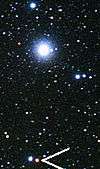RX Leporis
| Observation data Epoch J2000 Equinox J2000 | |
|---|---|
| Constellation | Lepus |
| Right ascension | 05h 11m 22.87s[1] |
| Declination | −11° 50′ 56.72″ |
| Apparent magnitude (V) | 5—7.4[2][3] (naked eye) |
| Characteristics | |
| Spectral type | M6.2III[1][2][3] |
| Variable type | Semi-regular pulsating (SRB)[1][2] |
| Astrometry | |
| Radial velocity (Rv) | 46.1[1] km/s |
| Parallax (π) | 6.71 ± 0.44[1] mas |
| Distance | 490 ± 30 ly (149 ± 10 pc) |
| Details | |
| Mass | 1—4[4] M☉ |
| Radius | 100—200[4] R☉ |
| Luminosity | 1500—4500[4] L☉ |
| Temperature | 3300[4] K |
| Other designations | |
HD 33664, HR 1693, HIP 24169, 2MASS J05112286-1150566, SAO 150206[1] | |
RX Leporis (RX Lep) is a star in the constellation of Lepus. It is a red giant and is a semi-regular pulsating star.
It has an apparent magnitude that varies from about 5 to 7.4.[2] At its brightest it is dimly visible to the naked eye, and at its dimmest can be located with binoculars. In the sky it is about 4 degrees south of Rigel and is located next to Iota Leporis.
See also
References
- 1 2 3 4 5 6 "RX Leporis". SIMBAD Astronomical Database. Retrieved 2012-08-31.
- 1 2 3 4 "GCVS Query=RX Lep". General Catalogue of Variable Stars @ Sternberg Astronomical Institute, Moscow, Russia. Retrieved 2012-08-31.
- 1 2 "RX Leporis". AAVSO: Variable Star Plotter (VSP). Retrieved 2012-08-31.
- 1 2 3 4 Jim Kaler. "IOTA LEP (Iota Leporis) and RX Lep". University of Illinois. Retrieved 2012-08-31.
External links
- RX Leporis on WikiSky: DSS2, SDSS, GALEX, IRAS, Hydrogen α, X-Ray, Astrophoto, Sky Map, Articles and images
- AAVSO: Quick Look View of AAVSO Observations (get recent magnitude estimates for RX Lep)
| ||||||||||||||||||||||||||||||||||
This article is issued from Wikipedia - version of the Friday, February 27, 2015. The text is available under the Creative Commons Attribution/Share Alike but additional terms may apply for the media files.
